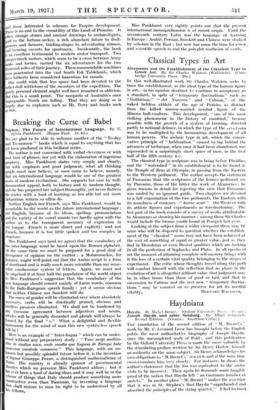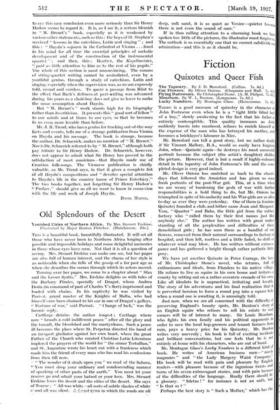Hay dniana
Haydn. By Michel Brenet. (Oxford University Pms-i:. net.;
Joseph Haydn and seine Sendung. By Alfred Sehnerich. Second Edition. (Vienna : Amalthea-Verlag.) Joseph Haydn and seine Sendung. By Alfred Sehnerich. Second Edition. (Vienna : Amalthea-Verlag.)
Tim translation of the second edition of " M. l3renees work by Mr. C. Leonard Leese has brought before the English public the most authoritative biography of Joseph Haydn, since the uncompleted work of Pohl ; and this publication by the Oxford University Press is-made the more valuable by the stimulating preface written by Sir Henry Hadow, himself an authority on the same.subject. Sir Henry acknowledges his own obligations to " M. Brenet's " research, and a t the same time cross-examines him very closely. For instance, he shows the author's statement that the lira was equivalent to the amid. viola to be incorrect. Then again he demands more tangible proof of the notion that Haydn left " an enormous number of motets." In another place " M. Brenet " makes the assertion that it was at St. Stephen's that Haydn "apprehended and absorbed the principles of the string quartet." I feel inclined to eye this easy conclusion .even more seriously than Sir Henry Hadow seems to regard it. It is, as •I see it, a serious-blemish in " M. Brenet's " book, especially as it is weakened by Various other statements, such as this : the boys of St. Stephen's received " lessons in the catechism, Latin and singing " ; and this : " Haydn's sojourn in the Cathedral at Vienna . .. fixed in his mind for all time the essential principles of melodic development and of • the construction of the instrumental quartet " ; and then, -this : , Reutter, the Kapellmeister, `; paid as little attention to him as to the rest of his pupils." The whole of this section is most unconvincing. The canons of string-quartet writing cannot be assimilated, even by a youthful genius, through a study of catechism, Latin and Singing, especially when the supervision was, as we are expressly told, casual and careless. To quote a passage from Riist to the effect that Bach's deftness at part-writing was advanced during his years as a choir-boy does not give its leave to make the same assumption about Haydn.
But " 31. Brenet's " work stands high for its biography father than its criticism. It presents this " good sort of fellow" to our minds and at times to our eyes, so that he becomes fo us even more lovable than before.
Mr. J. B. Trend, who has a genius for tracking out-of-the-way fa-as and events, tells me of a strange publication from Vienna on Haydn and his message. The book is strange, because the author, Dr. Schnerich, makes no mention of " M. Brenet." Nor is Dr. Schnerich referred to by " M. Brenet," although both pay tribute to Sir Henry Hadow. Dr. Schnerich, however, does not appear to admit what Sir Henry has proved to the satisfaction of most musicians—that Haydn made use of Croatian folk-songs. The Viennese publication is chiefly valuable, as Mr. Trend says, in that it gives a complete list of all Haydn's compositions and " devotes special attention to Haydn's life in the country house of Prince Esterhazy.." The two books together, not forgetting Sir Henry Hadovr's
Preface," should give us all we want to know in connexion With the life and work of Joseph Haydn.
BASIL MAINE.































































 Previous page
Previous page